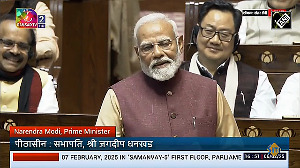The Reserve Bank of India is expected to allow banks to launch gold-linked deposit schemes that will help them hedge gold price related risks through commodity exchanges.
The move will allow banks to dabble in the commodities trade as current banking regulations do not allow commercial banks to trade directly in commodities. RBI approval for the scheme is expected in the next eight weeks.
It is also understood that an active dialogue has been initiated between the RBI and the Forward Markets Commission on whether gold should be treated as a commodity or a currency equivalent.
P H Ravikumar, managing director and CEO, National Commodity and Derivative Exchange Ltd, one of the four national level multi-commodity exchanges approved by FMC, said, "These gold-linked deposit schemes would operate similar to recurring deposits. Banks would be floating gold-backed deposit schemes where depositors would will be paying a nominal sum every month and would receive gold at the maturity of the deposit."
Ravikumar said some commercial banks are already in talks with RBI and are expecting to receive clearance for floating such schemes in the next six to eight weeks.
"Banks cannot cover the gold price related risks for each of these schemes on an individual basis. Hence they would pool all these deposits and cover their risks using the commodities exchange," he said.
Additionally, market watchers point out that since the value of gold imported into the country is estimated to be around Rs 40,000 crore (Rs 400 billion) annually, banks may not show much interest in other commodities.
These schemes subject to RBI clearance is expected to hit the market by December this year.
"In my own estimate I expect each of these monthly deposits to collect monthly deposits ranging between Rs 1,000 and Rs 5,000.
Ravikumar said in future banks may even start using commodity exchange as a route for agriculture finance.
NCDEX officials said a rough estimate of the potential futures market in commodities is about Rs 4,400,000 crore (Rs 44,000 billion) per annum.
This estimate is based on the assumption that futures trading could be four times the size of a physical market for commodities which is around Rs 1,100,000 crore Rs 11,000 billion).
Earlier this year, the Securities and Exchange Board of India, following the recommendation of Ramamurthy Committee, had decided to allow members of the National Stock Exchange to trade in the national level multi-commodity exchanges.
The entry of high net worth NSE members is expected to give shot in the arm for the national level commodities exchanges to take off. Ravikumar said: "We are looking at limiting the number of members at NCDEX to 250 over the next one year. We expect at least 100 members of the NSE to also become members of NCDEX."





 © 2025
© 2025